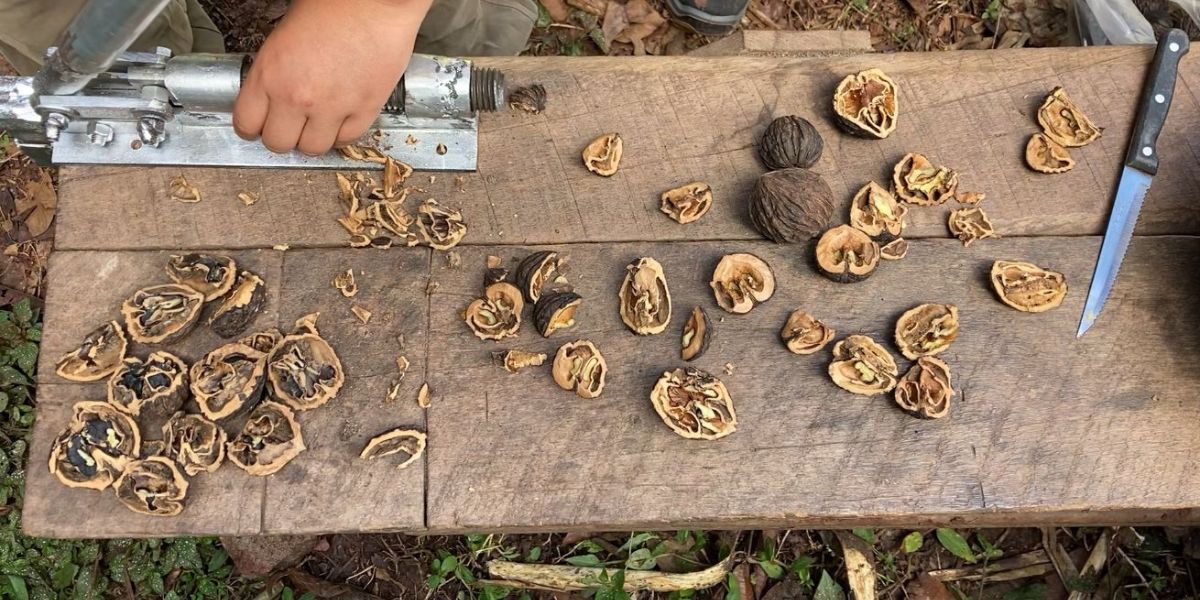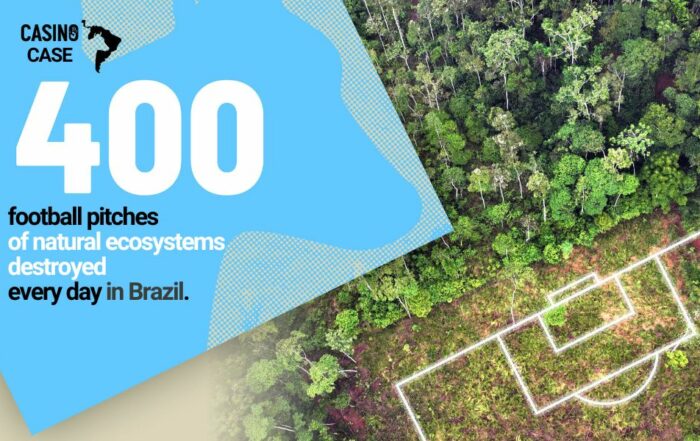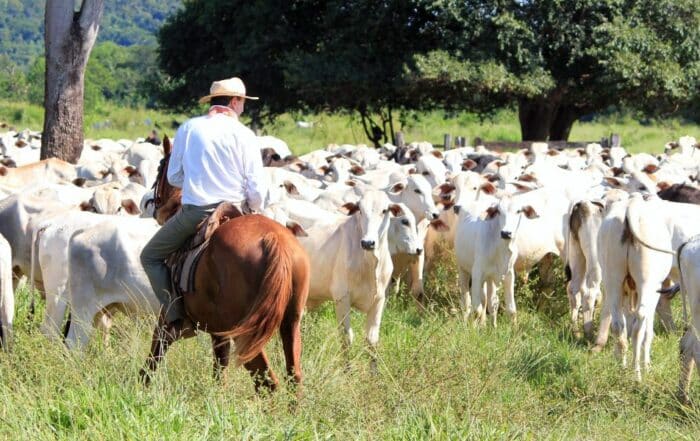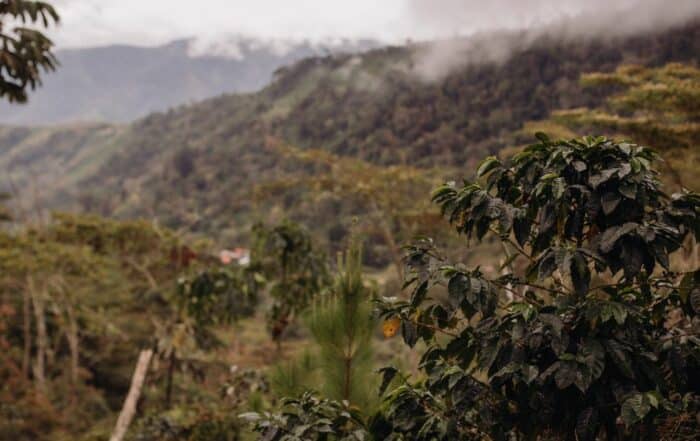The black walnut (Juglans netropica) is known all over the world for the benefits of its wood. For this reason, it is felled indiscriminately, which has led to it being classified as an endangered species (EN) by the International Union for Conservation of Nature (IUCN). In fact, «52% of its populations are overexploited for timber »(Esaú Toro Vanegas, Isabel Cristina Roldán Rojas).
Envol Vert, through its « Cocoa – Agroforestry Coffee in the Peruvian Amazon » programme, has set up the development of the ‘Black Walnut’ economic alternative. The aim is to preserve this species and the forests in which it is found, by exploiting and marketing this nut. Why did we choose the nut?
The nutritional benefits of consuming black walnut
Consuming black walnut is excellent for the health. It has the advantage of being made up of 57% unsaturated fatty acids, including linoleic acid (39g/100mg) and linolenic acid (8g/100g), as well as 18% protein and 11 mg/100g iron. It is therefore high in omega 3 (linolenic acid) and 6 (linoleic acid).
Compared with other seeds, the black walnut has high nutritional values in terms of iron, omega 3 and omega 6.
Per 100 grams of edible product :
Food composition table adapted from the Peruvian Ministry of Health (2017)
The promotion of the black walnut as a healthy, sustainable economic alternative
As well as promoting self-consumption by rural populations towards food sovereignty, this iron-rich nut helps combat anemia, a widespread problem in the rural areas of Peru. This wonder of the forest can be consumed in small quantities of 16 to 25g a day.
In April 2024, the Pichanaki team ran black walnut recipe workshops with 2 groups of participants in Alto Yapaz, Pampa Azangaro and Huerto, involving 15 farmers (70% of them women). The aim of the workshop was to share good manufacturing and hygiene practices when maintaining and processing the nuts, as well as advice on how to introduce this nut into their diet.
After a more theoretical stage, the participants were divided into several groups to open the nuts and prepare the various dishes: huancaína cream, tagliatelle with green sauce, cakes and sandwiches (rolls). The dishes were eaten in a convivial atmosphere at lunchtime.
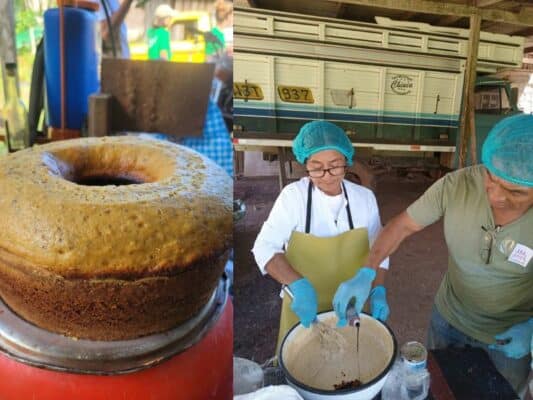
Participants preparing a delicious black walnut cake ©Envol Vert
In June, several local trade fairs will be organised by the municipality of Pichanaki, where some groups of participants will be able to sell products made from black walnuts (cake, pudding, sauce, etc.). These will be ideal occasions to start raising public awareness about the benefits of the black walnut and to start the selling of various products.
The black walnut (Juglans netropica) is known all over the world for the benefits of its wood. For this reason, it is felled indiscriminately, which has led to it being classified as an endangered species (EN) by the International Union for Conservation of Nature (IUCN). In fact, «52% of its populations are overexploited for timber »(Esaú Toro Vanegas, Isabel Cristina Roldán Rojas).
Envol Vert, through its « Cocoa – Agroforestry Coffee in the Peruvian Amazon » programme, has set up the development of the ‘Black Walnut’ economic alternative. The aim is to preserve this species and the forests in which it is found, by exploiting and marketing this nut. Why did we choose the nut?
The nutritional benefits of consuming black walnut
Consuming black walnut is excellent for the health. It has the advantage of being made up of 57% unsaturated fatty acids, including linoleic acid (39g/100mg) and linolenic acid (8g/100g), as well as 18% protein and 11 mg/100g iron. It is therefore high in omega 3 (linolenic acid) and 6 (linoleic acid).
Compared with other seeds, the black walnut has high nutritional values in terms of iron, omega 3 and omega 6.
Per 100 grams of edible product :
Food composition table adapted from the Peruvian Ministry of Health (2017)
The promotion of the black walnut as a healthy, sustainable economic alternative
As well as promoting self-consumption by rural populations towards food sovereignty, this iron-rich nut helps combat anemia, a widespread problem in the rural areas of Peru. This wonder of the forest can be consumed in small quantities of 16 to 25g a day.
In April 2024, the Pichanaki team ran black walnut recipe workshops with 2 groups of participants in Alto Yapaz, Pampa Azangaro and Huerto, involving 15 farmers (70% of them women). The aim of the workshop was to share good manufacturing and hygiene practices when maintaining and processing the nuts, as well as advice on how to introduce this nut into their diet.
After a more theoretical stage, the participants were divided into several groups to open the nuts and prepare the various dishes: huancaína cream, tagliatelle with green sauce, cakes and sandwiches (rolls). The dishes were eaten in a convivial atmosphere at lunchtime.

Participants preparing a delicious black walnut cake ©Envol Vert
In June, several local trade fairs will be organised by the municipality of Pichanaki, where some groups of participants will be able to sell products made from black walnuts (cake, pudding, sauce, etc.). These will be ideal occasions to start raising public awareness about the benefits of the black walnut and to start the selling of various products.

